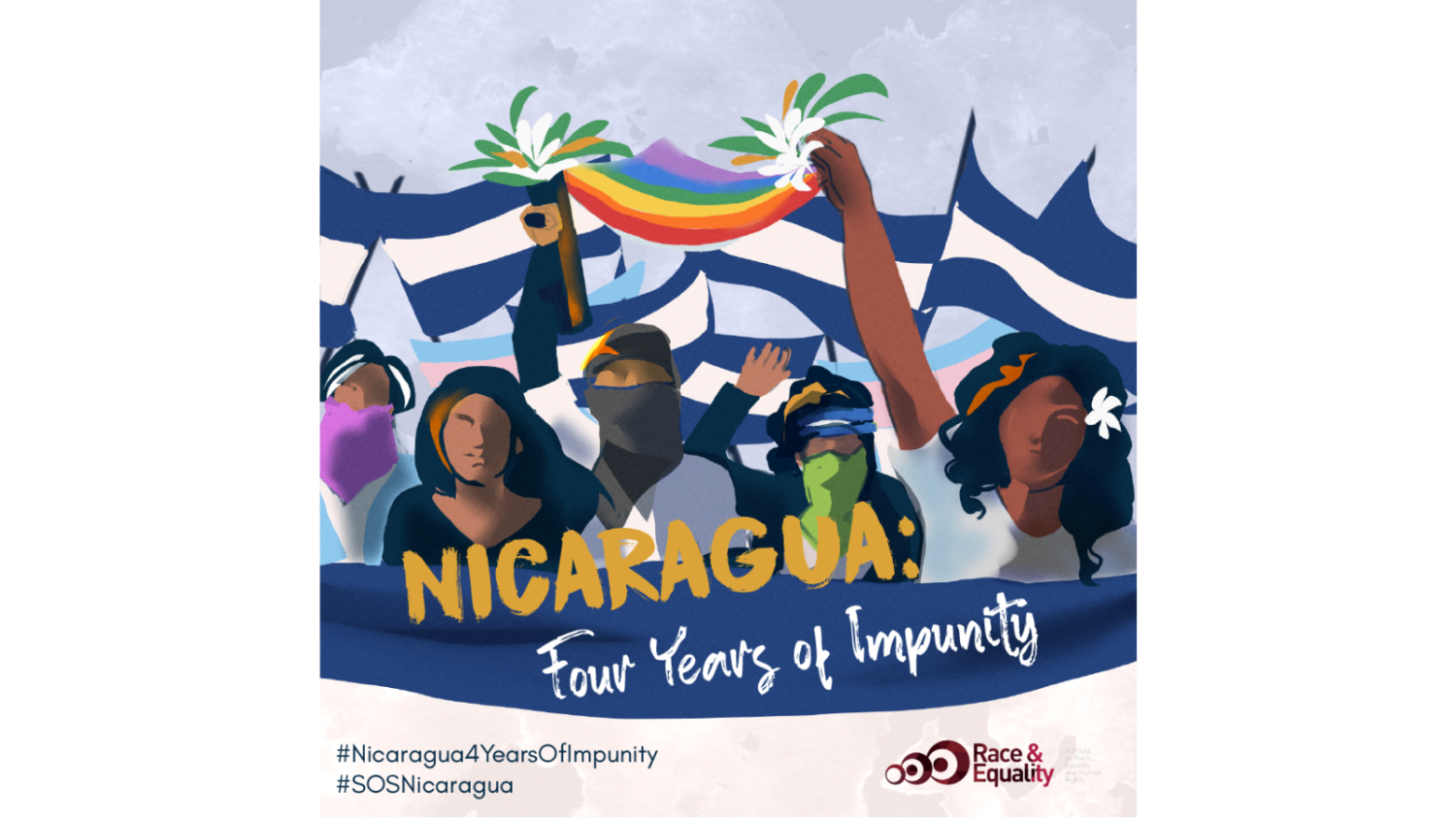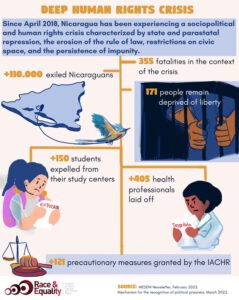Nicaragua, four years of impunity: Race and Equality launches a campaign that demands truth, justice, reparation, and no repetition for crimes against humanity
Washington DC, April 13, 2022.- On the fourth anniversary of the sociopolitical and human rights crisis in Nicaragua, the Institute on Race, Equality and Human Rights (Race and Equality) launches […]

Washington DC, April 13, 2022.- On the fourth anniversary of the sociopolitical and human rights crisis in Nicaragua, the Institute on Race, Equality and Human Rights (Race and Equality) launches the campaign “Nicaragua, four years of impunity” to denounce the serious violations of human rights that continue to occur in the Central American country, and to join the demands of processes that guarantee truth, justice, integral reparation of victims and non-repetition for crimes against humanity perpetrated in the framework of the violent and systematic repression of the civic rebellion of April 2018.
In addition, Race and Equality urges the international community to send a message to fight against impunity.
Context
Since April 2018, Nicaragua has been going through a deep crisis characterized by state and parastatal repression, the prolonged breakdown of the State of Decree, restrictions on civic space and the persistence of a situation of generalized impunity. This situation is manifested in severe violations of human rights that to this day have resulted in: 355 unpunished lethal victims, more than 2,000 injured protesters, at least 1,614 arbitrary arrests, the exile of more than 110,000 Nicaraguans, the growing criminalization of journalistic exercise, the closure of more than 114 civil society organizations, the upsurge of attacks against indigenous and Afro-descendant people on the Caribbean coast, and the permanence of more than 170 political prisoners under conditions that fail to comply with the Minimum Rules of the United Nations for the Treatment of Reclusive Persons (Nelson Mandela Rules) and the Internal Law on Human Rights, which may qualify for cruel, inhuman, degrading treatment, physical and psychological torture. These conditions are particularly violate 14 women, 13 people of third-age and people with chronic illnesses who are deprived of freedom.
situation is manifested in severe violations of human rights that to this day have resulted in: 355 unpunished lethal victims, more than 2,000 injured protesters, at least 1,614 arbitrary arrests, the exile of more than 110,000 Nicaraguans, the growing criminalization of journalistic exercise, the closure of more than 114 civil society organizations, the upsurge of attacks against indigenous and Afro-descendant people on the Caribbean coast, and the permanence of more than 170 political prisoners under conditions that fail to comply with the Minimum Rules of the United Nations for the Treatment of Reclusive Persons (Nelson Mandela Rules) and the Internal Law on Human Rights, which may qualify for cruel, inhuman, degrading treatment, physical and psychological torture. These conditions are particularly violate 14 women, 13 people of third-age and people with chronic illnesses who are deprived of freedom.
The regime of Daniel Ortega and Rosario Murillo continues to fail to comply with all the recommendations of the international mechanisms of human rights for the restoration of democratic institutions and guaranteeing human rights in the country. Last year (2021), in the pre-electoral context -mainly in the months of May and June, Daniel Ortega, in his effort to secure his fourth consecutive term, imprisoned 47 people. Among these people are found all those who have expressed their willingness to be candidates for the presidency of Nicaragua, as well as student and peasant leaders, journalists, businesspeople, people defending human rights, among others.
These illegitimate votes from last November, which gave Ortega the victory, allowed to glimpse the erosion of democracy and the perpetuation in the power of a government that systematically violates the human rights of the Nicaraguan population, and were questioned by the European Parliament, the United Nations (UN) and the Organization of American States (OAS). The latter assures that “they are not free, fair or transparent and do not have democratic legitimacy”, in accordance with international standards.
In February of this year (2022), the Judicial System of Nicaragua controlled by the regime, renewed the judgments against people arbitrarily detained in the pre-electoral and electoral context, under laws that unduly restrict the civic and democratic space, particularly the Law Special on Cybercrime (Law 1042), Law against money laundering, financing of terrorism and the proliferation of weapons of mass destruction (Law 977) and the Law on Defense of the Rights of the People to Independence, Sovereignty and Self-Determination for Peace (Law 1055). All these judgments were marked by serious violations of the guarantees of the procedural rights, such as the right to defense, the presumption of innocence, the equality of procedural parties, the right to be judged by an independent and impartial court. It is worth noting that, in all cases, the judged persons were sentenced to disproportionate penalties with alleged assumptions that the commission of alleged crimes did not demonstrate. Likewise, the right of defense was not respected by not allowing the submission of claims on the part of the prosecuted.
Last March 7, in the presentation of its annual report on the situation of human rights in Nicaragua, the High Commissioner Michelle Bachelet, denounced the faults in the process and the inhuman conditions that “have progressively deteriorated the state of health of those detained, particularly of older people and chronic patients”. Likewise, it urged the Human Rights Council (CDH) to take all measures to ensure the surrender of accounts. In order to guarantee justice, truth and reparation in the face of extrajudicial proceedings, arbitrary arrests and other serious violations of human rights, the Council approved a resolution that establishes during a year a “Group of Experts on Human Rights” with the mandate of investigation and surrender of accounts for the serious violations of human rights committed since 2018.
However, on the eve of the anniversary of the social protests, the Nicaraguan regime is repeating the repressive patronage against victims’ families, human rights defenders, journalists and other dissidents. On the day of April 12, relatives of Darwin Potosme, the lethal victim of the repression, denounced police harassment, trespassing of their home and threats of imprisonment by National Police agents. The opponent Yolanda González suffered the trespassing of her home in the presence of underage people, interrogations and surveillance by paramilitaries. The critical singer for the government, Josué Monroy of the band “Monroy y Surmenage”, the producer of “La Antesala”, Leonardo Canales; and the people producing musical events by SaXo Producciones, Salvador Espinoza and Xochitl Tapia, were also detained by police officers during a raid in their homes.
Campaign
Given this context, and as a way to commemorate the fourth anniversary of the civic rebellion in April 2018, Race and Equality will launch a campaign on April 18 that makes visible the serious abuses of human rights in Nicaragua, the hard work of organizations of civil society in the search for justice, and the positioning of the international community in this deep crisis.
We interviewed Nicaraguan human rights defenders about the current situation in the country, the conditions of political prisoners in the detention centers, their judgments, condemnations and the role of civil society in the defense of their rights. Additionally, we interviewed the Rapporteur for Nicaragua of the Inter-American Commission on Human Rights (IACHR), Esmeralda Arosemena, about the advances and challenges of human rights in Nicaragua, the role of the IACHR in the current context, the mechanisms and international instruments that exist for the rendition of accounts, among other aspects; and the Representative of the Office of the United Nations High Commissioner for Human Rights (OHCHR), Alberto Brunori, on the mechanism or group of three human rights experts that will investigate for one year the human rights violations committed since April 2018.
All the products of this campaign will be published through the accounts of Twitter , Facebook and Instagram , and the website of Race and Equality We invite the international community, national and international press and civil society to unite and share content using the hashtags #SOSNicaragua and #Nicaragua4YearsofImpunity , so that the cry for the cease of repression and demand for truth, justice, reparation and no repetition is heard in Nicaragua and all over the world.

